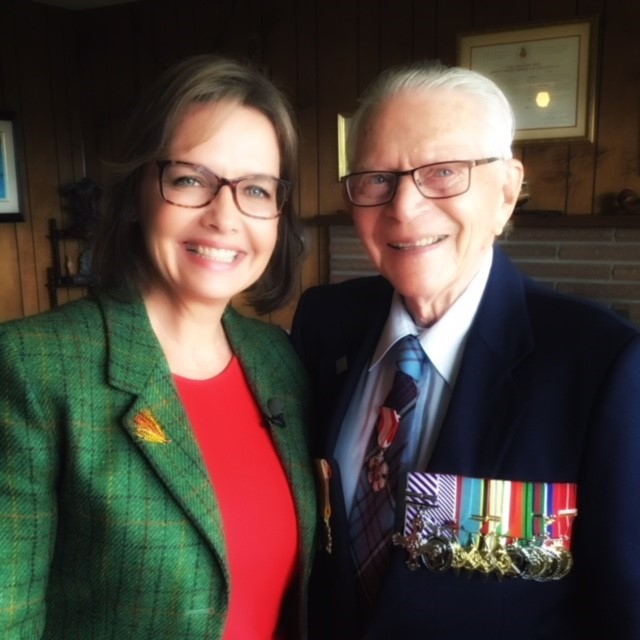To have lived through what Stocky Edwards did — dodging the enemy, losing friends, and still being alive to tell the tale — is remarkable enough. That he’s still telling it as he turns 98, with a sparkle in his eye and a spring in his step, is even more amazing.

He went from Prairie boy to aviation legend in just four years.
On the eve of D-Day 75 years ago, when 150,000 Allied troops were getting their orders for the invasion of Normandy, France, James Francis “Stocky” Edwards turned 23 years old. The boy from Saskatchewan had barely seen a plane until he signed up for the military at age 19.
Just a few years later, on the eve of a defining moment of the Second World War, he was already a veteran fighter pilot. He’d faced menace from every direction, had seen death first hand, and had shot down many enemy aircraft. And somehow, he’d beaten the odds. He was not only alive, he was an ace.
“We were called over to the commander’s office and he said, ‘Tomorrow morning, boys, is when we go,'” Edwards tells me from his Vancouver Island home.
Victory was the only option. They had to get to the continent to win the war.
WATCH: Indigenous man reflects on grandfather’s D-Day sacrifice

His squadron of Spitfires flew escort missions on D-Day, giving air support to the landing troops. “I can still still visualize it,” he says.
The memory of that day and those men is still vivid in his mind.

Get daily National news
“There were hundreds of Spitfires. And you could see pretty well everything that was going on because we were flying so low,” Edwards said. “You could see what was happening on the beach: the water was very rough; the men were going off the boats into water right over their heads — lots of them.”
Stocky Edwards was born on a farm near Nokomis, Sask. and was so determined to sign up in 1940, he walked miles into town to do it.
“All my buddies and I wanted to do was fly,” he recalled. “We’d hardly ever seen a plane, but still we wanted to be fighter pilots.”
He never lost his determination. After two years of training, he had his RCAF wings, was posted to North Africa, and was sent on his first operational mission.
He remembers it like it was yesterday.
WATCH: Exploring the relics of D-Day along Juno Beach

It was his first mission, and he shot down his first enemy airplane.
He also came very close to being shot down himself, yet he never hesitated about going up again, and tells me he was never afraid.
“I wasn’t afraid, but I was scared. There’s a difference,” Edwards explained.
“Scared means you’re nervous and you don’t know what’s going to happen. Afraid means you don’t want to go.”
It was the beginning of a stunning combat record in which he was tested multiple times, and always survived. By the time he retired from the Air Force, Edwards had completed 373 combat missions, shot down at least 19 enemy aircraft and destroyed hundreds of tanks and military vehicles.
He rose through the ranks as a leader known for making precision decisions at high speed, under unimaginable stress. And always keeping his cool.
His name is still legendary in aviation circles. Yet Stocky Edwards talks a lot about luck, and he tells me what he thinks was the real secret to his survival.
“I’ll tell you a little secret: I am a religious fellow. And I always said a little prayer in my cockpit and my guardian angel looked out for me.”
WATCH: D-Day invasion leaves lasting impression of compassion, camaraderie for veteran Norm Kirby

Being in the cockpit, he says, was like being in a holy place.
Now, all these years later, he still feels blessed to have survived — blessed that he was able to find his way home after the war and become a devoted husband and father.
A living legend of the Second World War, his thoughts on this D-Day anniversary are with those whose courage, bravery and skill was tested, too, but who didn’t come home.

Award-winning journalist Dawna Friesen is the anchor and executive editor of Global National, the flagship national newscast for Global News.







Comments
Want to discuss? Please read our Commenting Policy first.